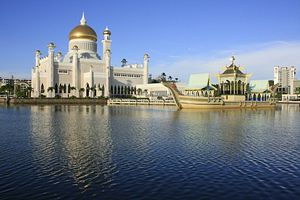Brunei officially prohibits public Christmas celebrations as they can lead Muslims astray and damage their faith, Brunei’s Ministry of Religious Affairs (MoRA) clarified in a statement over the weekend.
“These enforcement measures are…intended to control the act of celebrating Christmas
excessively and openly, which could damage the aqidah (faith) of the Muslim community,” the ministry said in a press release published in The Brunei Times over the weekend.
The statement came in response to reports last week that the Syariah Affairs Department’s Religious Enforcement Division had visited businesses in the capital Bandar Seri Begawan and instructed them to remove decorations including Christmas trees, banners and Santa Claus figures, as The Diplomat reported last week.
Brunei, a tiny, oil-rich country with a population of just around 420,000 people, two-thirds of whom are Malay-Muslim, is no stranger to religious restrictions. Many had feared that the practice would increase following the implementation of a strict new penal code in May, which curbed various forms of religious expression such as teaching, proselytism, religious publishing, and even speaking freely to Muslims and atheists about one’s own religious beliefs.
Yet this is the first time that the government has explicitly enforced and officially justified curbs on Christmas celebrations. Establishments that were warned last week expressed shock at the government’s unprecedented crackdown, noting that they had not received any prior official announcement of a policy change and that none of their customers had complained about the decorations as a threat to their religious beliefs.
“This was the first time we had received warnings about Christmas decorations since we opened in 2011,” an employee at Sorriso Restaurant told The Brunei Times in an interview.
The MoRA statement explicitly justifies the government’s ban using provisions from the new penal code and spells out the penalties for violating it – both for Muslims participating in these activities and non-Muslims organizing them.
The statement warns Muslims not to participate in Christmas celebrations, which includes “wearing hats or clothes that resemble Santa Claus.” Partaking in such actions is an offence under Section 207 (1) of the penal code, which is punishable by a fine of up to $20,000 and an imprisonment of up to five years, or both.
“Muslims should be careful not to follow celebrations such as these that are not in any way related to Islam, for it is feared that this could lead to tasyabbuh (imitation) and could unknowingly damage the aqidah (faith) of Muslims,” the statement said.
Meanwhile, the statement said non-Muslims could celebrate their religious festivities among their community but may not disclose or display them publicly to Muslims. Doing so would violate Section 209 (1) of the penal code which prohibits propagating religion other than Islam to a Muslim.
The statement claims that most businesses have reacted positively to the move and pledged to cooperate fully with the government.
“Alhamdulillah, a majority of business owners and entrepreneurs have given positive responses and full cooperation in this matter,” the statement said.
Yet the new curbs on Christmas celebrations have in fact already led to discontent among some people in Brunei. The Facebook page Boycott Brunei, which advocates repealing Brunei’s new penal code, published several excerpts of comments from Bruneians in online discussion forums explaining their opposition.
“If you have strong faith, nothing in this world can shake it…They make it sound like the moment you see one Christmas tree or deco you’ll go convert to Christianity right away. That’s so stupid,” wrote one Bruneian.
“I hope this is not a sign of things to come. Clearly there are individuals in the country who want nothing more than to turn Brunei into [Saudi] Arabia. These actions will do little to improve our image overseas and if more widely known would critically damage our international reputation,” said another.
Several of the comments also expressed concern about whether this may be a harbinger of similar crackdowns in the future on other non-Muslim celebrations, including Chinese New Year which falls in February.

































